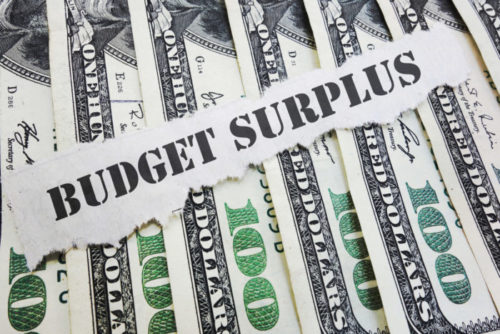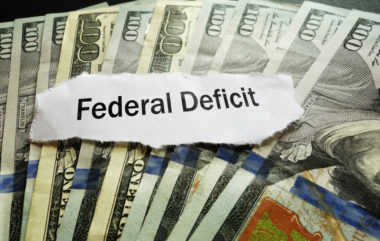A budget surplus refers to a situation in which a government or governing body has more income than is needed for its expenses.
In other words, a budget surplus takes place when a government brings in more money through sources of income such as taxes and receipts than it spends on things such as defense, education, or various welfare programs.
The government would calculate an actual budget surplus by subtracting the yearly expenses from the correlating income. For instance, if the U.S. brought in $500 billion in taxes and spent $450 billion during the same period of time, it would have a $50 billion surplus.
Table of Contents
The Importance of a Budget Surplus
Politicians often refer to a “budget surplus” as a positive thing, and for the most part, it is, especially when compared to a budget deficit. However, it’s important to understand the full impact that a budget surplus can have on the larger economic trends of a national economy.
A budget surplus is a healthy sign that a government is being effectively managed. This is a difficult feat to accomplish, as there are many financial responsibilities and commitments that most federal governments must maintain.
Any spending that is automatically required is considered mandatory spending. This would be the same as an individual needing to pay a mortgage or auto loan payment every month. Any other spending that is not automatically required is usually lumped under the title “discretionary spending.”
The U.S. budget is officially overseen by a non-partisan federal agency within the legislative branch of the government called the Congressional Budget Office (CBO).
When a budget surplus occurs, it can be used for a variety of different activities including:
- Making a purchase: This could be paying for a new program or investing in infrastructure projects. There are always additional governmental activities that are simply waiting until the money is available to put them into motion.
- Paying off debt: The U.S. national debt is over $22 trillion; putting a budget surplus towards paying off debt could foster a healthier economy for future generations.
- Letting it sit for future needs: If there are no immediate uses for the money, the government could save it, basically creating a national rainy day fund in the process.
Whatever it is specifically used for, there are plenty of positive benefits that come with operating a government with a budget surplus.
Budget Surplus vs. Deficit
The opposite of a budget surplus is a budget deficit. A deficit occurs when a government spends more money than it generates in income during a specific period of time.
To use a slightly amended version of the previous example, if the U.S. government brought in $500 billion in taxes and spent $600 billion in the same period of time, it would have a $100 billion deficit.
A deficit is typically paid for by borrowing funds, which means it will also accrue interest over time. In many ways, a budget deficit is just like an individual using a credit card to cover monthly expenses when these exceed their income.
Due to the negative behavior of needing to borrow funds, when budget deficits are repeated for too long or grow too large, they often require austerity measures to strictly curb the out-of-control spending.
Advantages of a Budget Surplus
There are many natural advantages to having a budget surplus.
Increased Flexibility
When a government produces a budget surplus, it frees its leaders up to have some flexibility in their spending decisions. Rather than sticking to a rigid budget in order to repay borrowed funds created by a deficit, a government operating with a budget surplus can more easily address additional spending needs.
It is similar to an individual choosing to purchase a new pair of shoes or replace a broken television when they realize that they have leftover money at the end of the month.
Lower Interest Costs
The U.S. government spent a staggering $393.5 billion on interest alone for its national debt in the year 2019. When budget surpluses are used to pay down debt, it frees up more money in the future that would have gone towards ballooned interest payments.
This is the same as an individual paying down a maxed-out credit card and, as a result, spending less money each month on interest to the credit card company.
Decrease Inflation
When the government spends less, it generally decreases the quantity of money available within the entire economic system. This naturally combats inflation, which may occur when there is too much money in circulation.
Disadvantages of a Budget Surplus
While there are several very good benefits that come from a budget surplus, as with all things on a massive scale, there are also several negative repercussions that can take place when a government is taxing more and spending less.
Deflation Effect
While it may initially have a positive effect by curbing inflation, at times a budget surplus can go too far the other way and actually cause deflation. This can happen in one of two different ways:
- Lower spending by a government can lead to less money in circulation.
- Higher taxes by a government can lead to less money spent by citizens.
In either case, deflation may occur. This might initially seem positive to the individuals operating within an economic system, as prices go down and their income stays the same. However, over time deflation can constrict economic activity, lowering demand, and making it difficult to get approved for credit as funds become scarce.
Low Levels of Investment
One of the easy-to-overlook side effects of a budget surplus is the simple fact that it takes more money out of an economy than it puts into it. As this reduces the quantity of funds in circulation it can lead to less overall cash available to invest.
Businesses that might otherwise have the funds to expand and grow their operations may find that they have less cash on hand.
While a budget surplus certainly isn’t all sunshine and roses, it is still a sign of healthy leadership and proper budgeting — which are challenging on a national scale. If government leaders choose to spend their excess funds as wisely as they created them in the first place, budget surpluses can be powerful tools that lead to a great deal of positive activity throughout a nation’s economy and infrastructure.
Image Source: https://depositphotos.com/





